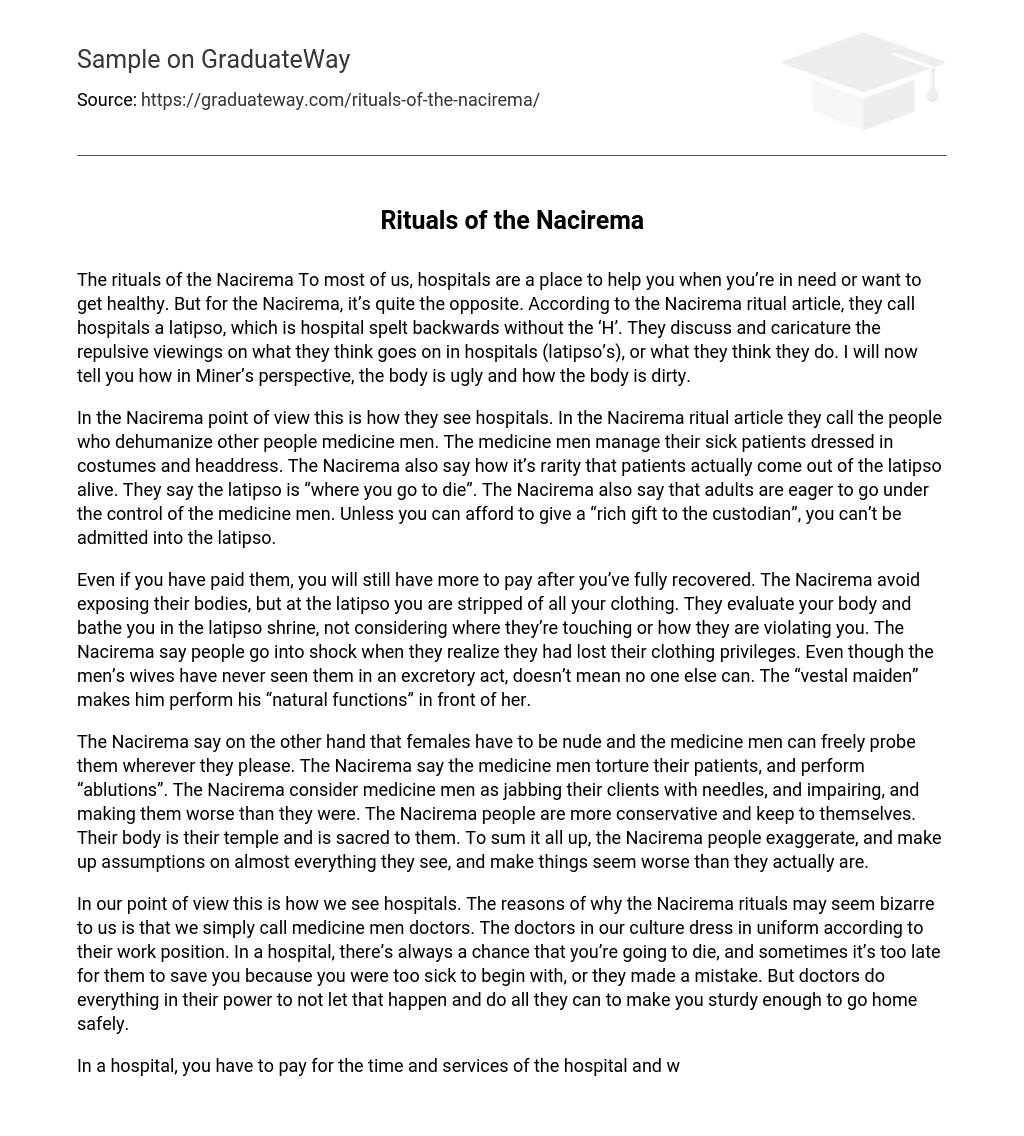The Nacirema have a unique perspective on hospitals, which they refer to as “latipsos”. In the Nacirema ritual article, they discuss and caricature their repulsive beliefs about what occurs in these institutions. According to Miner, the Nacirema view the body as ugly and dirty.
According to the Nacirema perspective, hospitals are perceived in a unique manner. In their article on Nacirema rituals, they refer to individuals who dehumanize others as medicine men. These medicine men attend to their sick patients while adorned in costumes and headdresses. The Nacirema also observe that it is uncommon for patients to emerge from the latipso (hospital) alive, as it is regarded as a place “where you go to die”. Additionally, the Nacirema mention that adults willingly submit themselves to the control of the medicine men, unless one can afford to present a valuable gift to the custodian, as without this act, admission into the latipso is denied.
Although payment has been made, additional expenses will arise even after full recovery. In the Nacirema culture, there is a strong aversion to exposing one’s body, but upon entering the latipso, individuals are completely disrobed. At this sacred site, their bodies are examined and they are cleansed, with little regard for personal boundaries or violations. It is believed that upon realizing their loss of clothing privileges, the Nacirema experience a state of shock. Just because a man’s wife has never witnessed him in an excretory act does not mean that no one else can. In fact, a “vestal maiden” requires him to perform such functions in her presence.
The Nacirema have a different perspective. According to them, females must be naked and are subject to the probing of medicine men wherever they choose. The Nacirema claim that these medicine men inflict torture on their patients and perform “ablutions”. Furthermore, the Nacirema believe that medicine men puncture their clients with needles, causing harm and worsening their condition. This society tends to be more insular and keeps to themselves. They view their bodies as temples and hold them as sacred. In conclusion, the Nacirema tend to exaggerate and make assumptions about almost everything they observe, frequently making situations appear worse than they really are.
This is our perspective on hospitals and the Nacirema rituals. We find the peculiarities of these rituals strange because we consider medicine men to be doctors in our society. Doctors in our society have specific uniforms that correspond to their job roles. In hospitals, there is always a chance of mortality, and sometimes it is too late to save a patient due to severe illness or medical mistakes. Nevertheless, doctors work hard to prevent such outcomes and aim to make patients well enough to safely go back home.
Regardless of financial difficulties, hospital workers will still provide assistance and seek alternative methods of payment. Doctors conduct examinations to determine the cause of health issues and provide necessary treatment. If patients are unable to bathe themselves, nurses offer private bathroom accommodations. Patients have the right to keep their clothes on unless a medical reason necessitates their removal, in which case they are given a private room to change into a gown.
Typically, men are required to change into a gown for physical examinations or when nurses need to examine them for logical or medical reasons. In contrast, women who are pregnant undergo examinations to monitor the baby’s progress. This is a common experience for almost everyone and does not involve any judgment or discrimination. In instances where individuals are seriously ill and unable to manage their own needs, nurses play the role of caretakers. They utilize thermometers to measure patients’ temperature and provide nourishment to aid in their healing and recovery.
On the other hand, doctors use needles to cure or prevent diseases to promote good health. The Nacirema assumptions may seem strange to us because hospitals do not appear as extreme. Patients undress and apply a greasy substance to their bodies before lying in a bright spaceship-like device. They remain in this device until they achieve a golden brown or burnt appearance. However, these are not the only peculiar practices they engage in.
They apply a viscous honey-like paste onto their bodies and then wrap themselves in a sheet. The sheet is subsequently yanked away from them, removing a layer of skin and causing blood to gush out, resulting in a tomato-like red appearance. These instances exemplify the two principles of the body being unattractive and filthy. It is unattractive because individuals resemble repulsively brown and red bloody beings, indicative of mental derangement. The body is considered dirty due to the repugnant and grotesque substances that are applied to cook and peel it.
The Nacirema view their bodies as sacred and treat them with utmost care, while we disregard our own bodies and ignore the consequences of our actions. What may seem normal to us might be seen as strange by those unfamiliar with these behaviors. This paper is relevant to the class because everyone will eventually visit a hospital and because we prioritize altering our physical appearance for self-esteem rather than focusing on our overall well-being.





